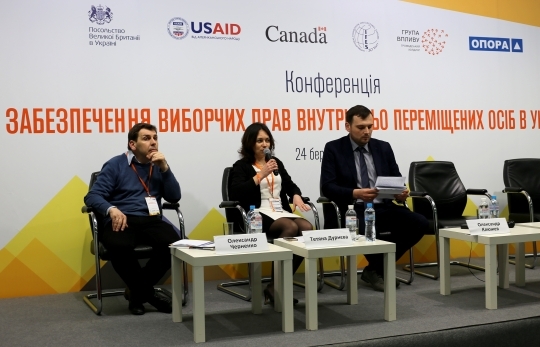However, the conference started with a flash mob performed by the IDPs themselves, but not from traditional welcoming speeches of participants. The activists made “live map” of Ukraine, and used Taras Petrnenko's song “Ukraine” to show that IDPs cannot sing together with all Ukraine. This song was recorded by internally displaced persons and so-called migrant workers for flash mobs, organized in 10 cities of Ukraine. The participants used the flash mob to demonstrate that it's possible to solve any problem if people unite.
Ambassador of the United Kingdom of Great Britain to Ukraine Judith Gough, who opened the conference, has emphasized: “Not only IDPs are interested in securing their voting rights. This issue is the key for solution of a wide range of other issues like legitimacy of the electoral process and good governance practice. It's vitally important to guarantee the IDPs right to vote and choose the direction of country's development and, what is more important for today, to work out the approach to establish peace.”
According to the Executive Director of Hrupa Vplyvu Civil Holding Tetiana Durnieva, there are many reasons why internally displaced persons cannot change their registration address in passport to gain political rights at a place of residence.
“We have researched the issue in focus groups in 10 regions of Ukraine and ascertained that besides the impossibility to register in their new communities, IDPs also choose not to change registration address fearing to lose property on occupied territories, to hazard themselves on boundary line, or just want to keep the bonding with their former home. Thus, the state should provide mechanisms allowing to change the voting address without changing the registration. People should vote in communities where they live but not where they are registered,” – she emphasized.
Electoral and Parliamentary Programs Coordinator of the Civil Network OPORA Olha Aivazovska said that Ukraine has a medieval approach to the voting right today. The internally displaced persons, who have suffered from the armed conflict, as well as migrant workers, cannot influence the life of communities where they live for a long time.
The worst is, according to her, when politicians have a negative approach talking about different citizen groups, which need to realize their voting rights.
“Women or simple workers who didn't belong to aristocratic families had also faced similar approach tens and hundreds years ago, even if they paid taxes. Approach to these citizens, who have suffered from international armed conflict and didn't have another choice than move to other territories controlled by Ukraine, is similar to medieval. The same situation is with migrant workers. However, the mobility of citizens is profitable, because they can invest their knowledge and potential in another community with better perspectives. Thus, they may be more valuable in their new communities than in the place of birth. In fact, it's good, judging from the countries that became corridors for ethnic groups and faced migration processes. These countries are more diverse and rich. They are rich not only financially, but also in culture, because they have gathered the best,” – Ms. Aivazovska stated.
According to the Analyst of the Civil Network OPORA Oleksandr Kliuzhev, NGO experts have developed a draft law, which eliminates discrimination of IDPs. The bill is on the stage of gathering signatures, to be registered in the Parliament.
“Law of Ukraine on the State Register of Voters, Law on Local Elections and other legislative acts of Ukraine do not secure the electoral rights of internally displaced persons, as well as of other mobile groups of citizens. Thus, they need to be amended guaranteeing nondiscriminatory franchise for all citizens of Ukraine. Legislative regulation of the voting rights should also take into consideration formal obstacles and difficulties in realization of constitutional rights and freedoms, which have emerged as a result of the internal migration or displacement,” – he emphasized.
<iframe width="560" height="315" src="https://www.youtube.com/embed/gW98MLpb53M" frameborder="0" allowfullscreen></iframe>
We would like to remind that according to the Ministry of Social Policy, there are 1,622,835 IDPs in Ukraine as of March 2017. Thus, nearly 4% of Ukrainian electorate is deprived of the right to vote. Internally displaced persons cannot exercise the basic constitutional right for the third year, due to the lack of legislative regulation. It should be mentioned that this problem also concerns so-called migrant workers.
The event was organized by the International Foundation for Electoral Systems (IFES), Hrupa Vplyvu Civil Holding NGO and Civil Network OPORA.
